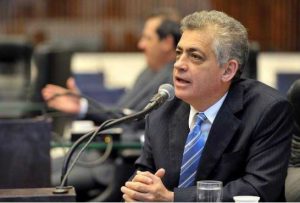. . DEMOCRATIC PARTICIPATION . .
An article from a Rede
Initiative for the implementation of Restorative Practices as State policy by the Parliamentary Council for the Culture of Peace – Conpaz
Draft Law No. 115/2017 was filed in the Legislative Assembly (Alep) this week (week of March 30) to create the “State Program of Implementation of Restorative Practices, Conflict Mediation and Culture of Peace in Paraná.” The plan for the system includes a Management Council, an Executive Committee and nuclei with conflict mediators scattered throughout the State.

Pericles de Holleben Mello, image: divulgação
According to the justification of the project, “the nuclei (…) can be installed in Schools, Resident Associations, Social Assistance Networks, Guardianship Councils, Parents and Teachers Associations, or any other institution, or entity, with nature Public or private law, whether or not bound to the State, as long as authorized by the Management Board. ”
According to the secretary general of Conpaz, state deputy Péricles de Holleben Mello, the concept of a Culture of Peace can help people from all social classes, from any ethnic group or religion, embrace the idea of overcoming violence. “In this way it will be possible to contribute to the transformation of schools and communities that experience situations of violence into spaces of dialogue and peaceful resolution of conflicts.”
Restorative justice is a new model of justice recommended by the United Nations – Resolution 12/2002 – in view of the need for a more adequate response to the resolution of conflicts in society.
For Pericles, “… the dehumanized society in which we live privileges a sterile rationality. In this sense, Restorative Justice proves to be valuable, because it confronts situations of conflict, or its prevention, from the incorporation of the emotions and feelings inherent in the human condition. ” The program will include representatives of the Executive, Legislative and Judiciary, Brazilian Bar Association, Public Defender’s Office, Public Prosecutor’s Office and institutions of organized civil society.
In the justification for the project, the authors argue that “the restorative model seeks to raise awareness and accountability of the parties involved in the conflict relationship, insofar as it proposes the rapprochement between victim, aggressor, family members and the community to which they belong. Since crime represents a rupture of the social fabric, reparation for damages can be achieved. through dialogue that addresses the needs and potentials of all those involved,
The project is an initiative of the Conpaz Secretary General, Deputy Péricles, with 10 more members of the Council, Cristina Silvestri, Rasca Rodrigues, Pastor Edson Prackzik, Tercilio Turini, Marcio Pauliki, Paulo Litro, Evandro Araújo, Chico Brasileiro, Claudio Palozzi and Guto Silva.